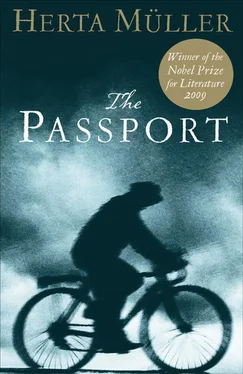Windisch swallows a soft white noodle. It sticks in his throat. Windisch puts his spoon on the table and coughs. His eyes fill with water.
Windisch brings up the soup into his plate. His mouth tastes sour. It rises to his brow. The soup in Windisch’s plate is cloudy from the vomit.
Windisch can see a large courtyard in the soup. It’s a summer evening in the courtyard.
That Saturday Windisch had danced through the night with Barbara in front of the deep horn of the gramophone. They talked about the war as they waltzed.
A paraffin lamp flickered under the quince tree. It stood on a chair.
Barbara had a thin neck. Windisch danced with her thin neck. Barbara had a pale mouth. Windisch hung on her breath. He swayed. The swaying was a dance.
Under the quince tree, a spider had fallen into Barbara’s hair. Windisch didn’t see the spider. He leant against Barbara’s ear. He heard the song on the gramophone through her thick black plait. He felt her hard comb.
By the paraffin lamp, Barbara’s green clover leaves shone from both ears. Barbara whirled in a circle. The whirling was a dance.
Barbara felt the spider on her ear. She started. Barbara cried: “I’m dying.”
The skinner danced in the sand. He danced past. He laughed. He took the spider from Barbara’s ear. He threw it in the sand. He stamped on it with his shoe. The stamping was a dance.
Barbara had leant against the quince tree. Windisch held her head.
Barbara’s hand went to her ear. The green clover leaf no longer hung on her ear. Barbara didn’t look for it. Barbara didn’t dance any more. She wept. “I’m not weeping for the earring,” she said.
Later, many days later, Windisch had sat with Barbara on a bench in the village. Barbara had a thin neck. One green clover leaf shone. The other ear was dark in the night.
Windisch shyly asked about the second earring. Barbara looked at him. “Where would I have looked for it?” she said. “The spider took it away to the war. Spiders eat gold.”
After the war Barbara followed the spider. The snow in Russia took her away, when it melted the second time.
Amalie licks a-chicken bone. The lettuce crunches in her mouth. Windisch’s wife holds a chicken wing to her mouth. “He’s drunk all the schnaps,” she says. She sucks at the yellow skin. “Out of grief.”
Amalie pricks a lettuce leaf with the prong of her fork. She holds the leaf to her mouth. She speaks and the leaf trembles. “You won’t get far with your flour,” she says. Her lips hold the lettuce leaf tight like a caterpillar.
“Men have to drink because they suffer,” smiles Windisch’s wife. Amalie’s eye shadow is a blue fold over her eyelashes. “And suffer, because they drink,” she giggles. She looks through a lettuce leaf.
The love bite on her neck is darker. It’s turning blue, and it moves, when she swallows.
Windisch’s wife sucks the small, white bones. She swallows the short pieces of meat on the chicken’s neck. “Keep your eyes open, when you get married,” she says. “Drinking is a bad illness.” Amalie licks her red fingertips. “And unhealthy,” she says.
Windisch looks at the dark spider. “Whoring is healthier,” he says.
Windisch’s wife strikes the table with her hand.
Windisch’s wife had been in Russia for five years. She had slept in a hut with iron beds. Lice cracked in the edges of the beds. She was shaved. Her face was grey. Her scalp was red-raw.
On top of the mountains there was yet another mountain range of clouds and drifting snow. Frost burned on the truck. Not everyone got off at the mine. Every morning some men and women remained sitting on the benches. They sat with open eyes. They let everyone go past. They were frozen. They were sitting on the other side.
The mine was black. The shovel was cold. The coal was heavy.
When the snow melted the first time, thin, pointed grass grew in the snow stone hollows. Katharine had sold her winter coat for ten slices of bread. Her stomach was a hedgehog. Every day Katharina picked a bunch of grass. The grass soup was warm and good. The hedgehog pulled in its spines for a few hours.
Then the second snow came. Katharina had a woollen blanket. During the day it was her coat. The hedgehog stabbed.
When it was dark, Katharina followed the light of the snow. She bent down. She crawled past the guard’s shadow. Katharina went into a man’s iron bed. He was a cook. He called her Käthe. He warmed her and gave her potatoes. They were hot and sweet. The hedgehog pulled in its spines for a few hours.
When the snow melted the second time, grass soup grew beneath their shoes. Katharina sold her woollen blanket for ten slices of bread. The hedgehog pulled in its spines for a few hours.
Then the third snow came. The sheepskin was Katharina’s coat.
When the cook died, the light of the snow shone in another hut. Katharina crawled past the shadow of another guard. She went into a man’s iron bed. He was a doctor. He called her Katyusha. He warmed her and gave her a white piece of paper. That was an illness. For three days Katharina did not need to go to the mine.
When the snow melted the third time, Katharina sold her sheepskin for a bowl of sugar. Katharina ate wet bread and sprinkled sugar on it. The hedgehog pulled in its spines for a few days.
Then the fourth snow came. The grey woollen socks were Katharina’s coat.
When the doctor died, the light of the snow shone over the storeyard. Katharina crawled past the sleeping dog. She went into a man’s iron bed. He was the grave digger. He buried the Russians in the village too. He called her Katja. He warmed her. He gave her meat from the funeral meals in the village.
When the snow melted the fourth time, Katharina sold her grey woollen socks for a bowl of maize flour. The maize porridge was hot. It swelled up. The hedgehog pulled in its spines for a few days.
Then the fifth snow came. Katharina’s brown cloth dress was her coat.
When the grave digger died, Katharina had put on his coat. She crawled through the fence along the snow. She went to an old Russian woman in the village. The grave digger had buried her husband. The old Russian woman recognized Katharina’s coat. It was her husband’s coat. Katharina warmed herself in her house. She milked the goats. The Russian woman called her Devochka. She gave her milk.
When the snow melted the fifth time, yellow clusters of flowers bloomed in the yard.
A yellow dust floated in the grass soup. It was sweet.
One afternoon green trucks drove into the storeyard. They crushed the grass. Katharina sat on a stone in front of the hut. She saw the dirty tracks of the tyres. She saw the strange guards.
The women climbed up onto the green trucks. The tyre tracks didn’t lead to the mine. The green trucks stopped in front of the little station.
Katharina climbed onto the train. She wept with happiness.
Katharina’s hands were sticky with grass soup, when she learned that the train was going home.
Windisch’s wife switches on the television. The singer leans against a railing by the sea. The hem of her skirt flutters. The tips of the singer’s slip hang above her knee.
A seagull flies over the water. It flies close to the edge of the screen. Its wing tip thrusts into the room.
“I’ve never been to the seaside,” says Windisch’s wife. “If the sea wasn’t so far away, seagulls would come to the village.” The seagull plunges down to the water. It swallows a fish.
The singer smiles. She has the face of a seagull. She opens and closes her eyes as often as her mouth. She sings a song about the girls from Romania. Her hair wants to be water. Small waves ripple at her temples.
Читать дальше












